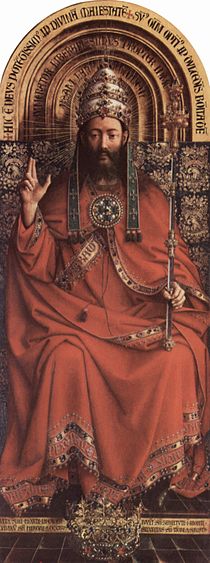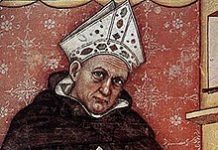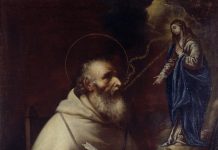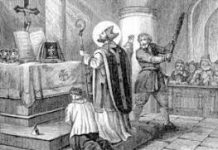‘When the Son of Man comes in his glory, and all the angels with him, then he will sit on the throne of his glory’ (Mt. 25:31). ⧾
On this, the last Sunday of the liturgical year, we celebrate the great Feast of Christ the Universal King and contemplate Him as both the Good Shepherd and the Lord of history. All the nations will be gathered before him, and he will separate people one from another as a shepherd separates the sheep from the goats (Mt. 25:32). The Gospel of St. Matthew which we have read in the course of this liturgical year, contains two collections of parables: eight parables depicting the present character of the Kingdom of God (13:1-52), and an equal number of end-time Kingdom parables (24:32-25:46), the last of which is the parable of the last judgment. Come, O blessed of my Father, inherit the kingdom prepared for you from the foundation of the world; for I was hungry and you gave me food, I was thirsty and you gave me drink, I was a stranger and you welcomed me, I was naked and you clothed me, I was sick and you visited me, I was in prison and you came to me….Truly I say to you, as you did it to one of the least of these my brethren you did it to me (Mt. 25:34-40). These familiar words have inspired great works of art such as Michelangelo’s famous Last Judgment in the Sistine Chapel; and they have inspired great acts of charity, in the marvelous work that is a holy life, a life transformed by the grace and charity of Christ Our Lord. These words are a summary of our Christian life and they express the foundational principles of a culture of life that seeks the well-being of humanity in this world, and man’s salvation so that we might live with God forever in eternity. Yet, these words are not so out of the ordinary because if you have raised a family or have looked after loved ones in their sickness or in their time of need, you have done all these things.
By extension, you belong to a parish, the family of families; and as a result, you also do these things beyond the intimate circle of your own family. A properly ordered parish recognises that Christ is the King and that the life of charity which defines a parish has its source and summit in the Eucharistic Sacrifice. Christ our King governs this parish from the Tabernacle, His Eucharistic throne. The Good Shepherd guides us and nurtures us with His word of truth and with the Sacraments. It’s a simple recipe. If only we followed it! Our Lord nourishes the souls of His children through the ministry of the priest who models his life on the pattern of Our Lord’s own life. The good shepherd lays down his life for the sheep (Jn. 10:11). We fool ourselves if we think that we can live the Christian life without the spirit of sacrifice.
Our celebration of this great Feast this year includes the blessing and dedication of our shrine to St. John Marie Vianney, the Patron of priests. His shrine as you can see, is near the shrine of St. Joseph,
Patron of the Universal Church, and also the shrine of Pope Saint Pius X, the great defender of the Catholic Faith from the errors of modernism, the synthesis of all heresies. It was Saint Pius who beatified St. John Vianney, the first parish priest to be canonized…and hopefully not the last. In this corner of our church we, especially the men of the parish, though not only the men, have a visual lesson of what God expects of us. Like St. Joseph, we must be obedient to the law of God; just in our undertakings and prompt in fulfilling the demands of God law. Like Saint Joseph we must cherish and protect what is entrusted to us. We are the guardians of life, both natural life and the life of grace. This is especially true of the priest to whom is entrusted the custody of the Eucharist, the Bread of Life. St Pius X made it his work as pope to restore all things in Christ; and indeed he did so. The fifty years following his death were years of phenomenal growth and apostolic fruitfulness – and this despite two world wars, the proliferation of ideologies of hate and the ever looming threat of Communism.
St. John Vianney, whose image now graces our church, was a true shepherd of his flock according to the Heart of Christ Our Lord. St. John Vianney said that the priesthood is the love of the Sacred Heart of Jesus, and his priestly life which he spent in the parish of Ars in France was just that; an outpouring of love for his flock which in time included people who traveled from all over France and beyond. Why did pilgrims come to his little parish? Quite simply, because he had managed to preserve what the revolution had done so much to destroy, a community whose heart was the Tabernacle in the parish church. It is not so different today. A traditional Catholic parish is a threat to the revolutionary forces of our time, especially the revolutionaries in the Church – old hippies who forget that soon they will have to give an account to God of their stewardship, as we all will. To understand and appreciate the importance of St. John Vianney especially as a much needed model of the priesthood, we must say something about his life. He was born in 1786, just three years before the beginning of the French Revolution, a great reset of sorts, restricted to France alone. As a result of this revolt against God Himself, churches in France were closed, Catholic worship outlawed and priests hunted down. As a result, young John Marie made his First Communion in a barn; yes, a barn. Some say it was in a neighbour’s kitchen. Regardless, during the Mass, the windows were covered so that the light of the candles could not be seen from the outside. It was a dark time during which horrific crimes were committed against people, all in the name of liberty. It was a violent attempt to establish a world without God, a so-called secular world.
Our times are not much different. Our churches have also been closed once this year, and in all likelihood they will be closed very soon again. On Monday, in Toronto and in Peel region the churches will be closed and there will be no public Masses. We are not far behind. We are living through what our politicians refer to as the great reset. This is not the stuff of conspiracy theories. Politicians have spoken of the pandemic as an opportunity to achieve sustainable development goals and to imagine a new world order, a world without God, a world governed by a select few whose guiding principle is nothing other than the lust of domination (libido dominandi). As frightening as this sounds, they will fail as others have failed before them, quite simply because Christ is the Universal King. He is the Lord of history. Nevertheless, we must pray and fortify ourselves lest we deny Our Lord and Saviour. Not everyone who says to me, ‘Lord, Lord,’ will enter the kingdom of heaven, but the one who does the will of my Father who is in heaven (Mt. 7:5). Let us encourage one another through our faithful witness. This is what is required of all of us, young and old.
St. Peter Julian Eymard (+1868) a Saint known as the Apostle of the Holy Eucharist teaches us that the Triumph of Christ the King is brought about through the Eucharist. Christus vincit, regnat, imperat; ab omni malo plebem suam defendat. Christ conquers, He reigns, He commands. May He defend His people from all evil. Pope Sixtus V had these words engraved on the obelisk which stands in the centre of St. Peter’s Square in Rome.
These magnificent words are in the present tense, and not in the past, to indicate that Christ’s triumph is always actual, and that it is brought about in the Eucharist and by the Eucharist. This is why even in the midst of the darkest confusion we never lose heart, for His Eucharistic Presence guarantees us the assistance of His grace and strength and Presence. Our Lord’s eternal today embraces all history including our own individual history; with its lights and shadows and our own troubled times. Everything is illumined by the healing truth and light of Christ. St. Peter Julian further explains: Jesus does not rule over earthly territories, but over souls, and He does so through the Eucharist. A king must rule through his laws and through the love of his subjects for him. The Eucharist is the law of the Christian….How unhappy are the nations that no longer possess the Eucharist!
Our churches may close but the Holy Sacrifice will still be offered and so we will still possess the Eucharist. You must unite yourselves each day to the Masses being offered throughout the world and you must not give in to discouragement because Our Lord does not leave us without the necessary means of salvation. ‘Fear not, little flock, for it is your Father’s good pleasure to give you the kingdom (Lk. 12:32). God will not be mocked. More than ever you must now practise the devotion to the Most Sacred Heart of Jesus. Please avail yourselves of the prayer books available at the shrine of the Sacred Heart. There is a providence of books and that little prayer book explains why it is important especially in times of persecution, as our time has become, to consecrate ourselves to the Sacred Heart of Jesus, King and Centre of all hearts. Today, in place of the Prayer of the Faithful, I will recite the Act of Consecration of the Human Race to the Sacred Heart of Jesus; first prescribed for the whole Church by Pope Leo XIII and subsequently prescribed to be recited each year on the Feast of Christ the King by Pope Pius XI. This Feast as you know, was established by Pope Pius XI in 1925 at a time when violent persecution was being unleashed on the Church in many countries and godless ideologies of hate especially political atheism (Communism) sought to subjugate humanity. A long struggle has brought us to our time of trial.
The Tabernacle of our church is the throne of Christ our Eucharistic Lord and King; and through His Eucharistic Presence in all the tabernacles of the world in a certain sense He exercises His universal kingship. In the reception of the Sacrament of His Body and Blood and in our own prayer of Adoration in His Eucharistic Presence we acquire the wisdom of knowing what is most important in life; and we are given the grace both to experience already in this life and to build up the Kingdom that Our Lord has established by His Sacrifice on the Cross: an eternal and universal kingdom, a kingdom of truth and life, a kingdom of holiness and grace, a kingdom of justice, love and peace (Preface, Feast of Christ the King, The Roman Missal). The self-giving love that the Eucharist makes present is the only hope for our world. It is the spirit of sacrifice that will sustain us now and in the time of trial that is upon us. I have endeavoured to prepare you for this time of trial and persecution. We have entered into the time of tribulation. This is by no means an exaggeration. For a time it may seem that the forces of this world arrayed as they are against the Church of God – and sadly aided and abetted by traitors in the Church herself – appear to have the upper hand. Do not be deceived. Do not be discouraged. Christ is the Universal King!
Let us continue then, to pray for one another and to encourage one another along the path of devout humility, patterning our lives on those of Our Lord and Our Lady. May she whom we lovingly venerate as our Mother and our Queen, guard us and guide us. May the Triumph of her Immaculate Heart, the Heart that is our sure refuge and the way that will lead us to God usher in the social kingship of the Sacred Heart of Jesus, burning furnace of charity. May the charity of the Sacred Heart of Jesus ever be for us the inspiration for all that we do. Most Sacred Heart of Jesus, have mercy on us. ⧾











